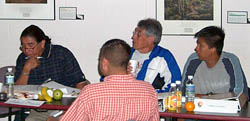Who conducts Ethnographic Research?
Cultural anthropologists conduct most ethnographic research. Not only do they look at past human experience, but living people’s ideas, values and viewpoints as well. They do this by observing daily rounds or the day-to-day activities of individuals within communities. Indeed, many consider ethnographic research the foundation of cultural anthropology. Anthropologists attempt to understand human behavior in the context of all of humanity. Anthropologists are a group of trained professionals who conduct an intensive study of a group of people who live among each other and share similar beliefs, behaviors, rituals, and the like. Our goal is to come closer to understanding what makes humans “human.”
Cultural anthropologists, however, are not the only people who can engage in ethnographic research. Those interested in “discovering” more about people, places, and spaces who are trained in ethnographic techniques, usually by experienced ethnographers, can also conduct ethnographic research. Community members who engage in community ethnography are helpful in the research process because they are able to recognize the importance of place and space within their community, gain access to possible consultants within the community, and provide local knowledge that researchers new to the community may not possess. Community ethnographers not only lend a hand in the research process, but also have the opportunity to learn more about their communities through the research process






